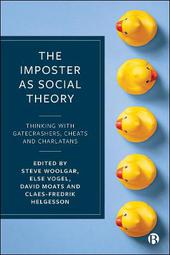
|
The Imposter as Social Theory: Thinking with Gatecrashers, Cheats and Charlatans
Paperback / softback
Main Details
| Title |
The Imposter as Social Theory: Thinking with Gatecrashers, Cheats and Charlatans
|
| Authors and Contributors |
Edited by Steve Woolgar
|
|
Edited by Else Vogel
|
|
Edited by David Moats
|
|
Edited by Claes-Fredrik Helgesson
|
| Physical Properties |
| Format:Paperback / softback | | Pages:350 | | Dimensions(mm): Height 234,Width 156 |
|
| Category/Genre | Social and political philosophy |
|---|
| ISBN/Barcode |
9781529213089
|
| Classifications | Dewey:001.95 |
|---|
| Audience | | Professional & Vocational | |
|---|
| Illustrations |
32 Illustrations, black and white
|
|
Publishing Details |
| Publisher |
Bristol University Press
|
| Imprint |
Bristol University Press
|
| Publication Date |
1 August 2022 |
| Publication Country |
United Kingdom
|
Description
Proposing 'thinking with imposters' as a valuable new tool of analysis in the social sciences and humanities, this revolutionary book shows how the figure of the imposter can help upend social theory. The figure of the imposter can stir complicated emotions, from intrigue to suspicion and fear. But what insights can these troublesome figures provide into the social relations and cultural forms from which they emerge? Edited by leading scholars in the field, this volume explores the question through a diverse range of empirical cases, including magicians, spirit possession, fake Instagram followers, fake art and fraudulent scientists.
Author Biography
Steve Woolgar is Professor of Science and Technology Studies at Linkoeping University and Professor of Marketing Emeritus at Oxford University. Else Vogel is Assistant Professor at University of Amsterdam. David Moats is Research Fellow at the University of Helsinki. Claes-Fredrik Helgesson is Professor and Research Director at the Centre for Integrated Research on Culture and Society (CIRCUS) at Uppsala University.
Reviews"This timely volume responds to a larger societal fascination with scammers, tricksters, and fabulists... highlights the imposter as a figure that can help us understand social (dis)order." Science as Culture A comprehensive picture of imposters, marking a new concept and new departure. An astonishing range of examples which are important, unexpected, and clever. Stephen Turner, University of South Florida Offering the imposter as a figure for social theorizing in a time of post-truth is both bold and acute. An urgent call for rethinking and re-ordering reality. Amade M'charek, University of Amsterdam This book is for anybody bored to tears with the present, repetitive and dull, mainstream social theory. Barbara Czarniawska, University of Gothenburg This sparkling book on imposters is the real thing. In a world of fakes, masks and ghosts, the authors show that the action of the imposter is not a performance or a trick but an experiment, a speculation offered to test the limits of appearance in social life. Arjun Appadurai, New York University
|